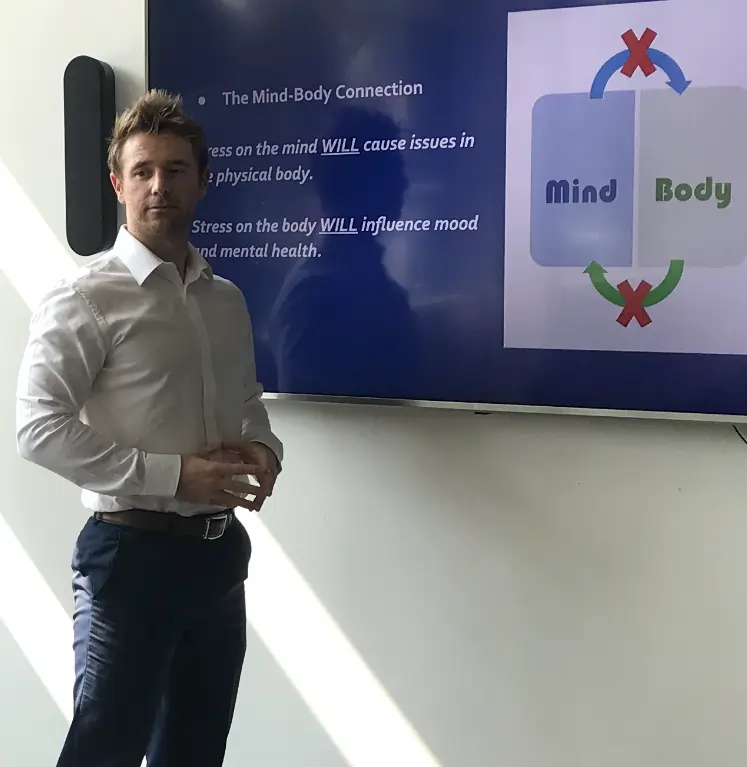
Having a mindfulness practice is akin to being present and having a conscious awareness of yourself and what is around you in the moment.
Whether you are trying to maintain that throughout the day, or deliberately taking time out to focus on it’s pursuit for a few moments per day, simply introducing it into your life in a way that works for you can not only improve your mental health and reduce stress, it can also improve your attention span and focus which may assist in your day to day tasks at home and in the workplace.
Mindfulness & Exercise
One of the fascinating things about mindfulness and the way it interacts with exercise is that it arguably makes your workouts more effective. Perhaps not directly in the performance sense, but by helping to reduce stress. Which will then help to lower stress hormones like cortisol. This is important because cortisol has been demonstrated to be catabolic (through muscle protein degradation) and impedes one’s ability to lose body fat which is the complete opposite of what you’re looking to see happen in the pursuit of most fitness goals. This essentially means that no matter how effective your workout program is, on paper, you just won’t be getting the most out of it if you’re compromised by chronic stress.
Which reminds me, and this is worth mentioning, without being weighed down by the technicalities, if your goal is to build muscle, one of the mechanisms to achieve this is utilising your maximum recoverable volume or exercise, i.e the maximum amount of stress you can put on your muscles without reaching the point of fatigue from which you can’t recover. So it stands to reason that if gaining muscle is on your goal list reducing or managing your stress levels is a smart move.
In fact, regardless of exercise goal, I set almost all of my online personal training clients a short daily mindfulness exercise like the one below for exactly the reasons I’ve outlined above.
I started doing this after a survey of my online personal training clientele revealed that over 80% of them were experiencing stress on a daily basis. A subsequent survey revealed that after a daily movement practice and setting some time aside for mindfulness, plus the regular exercise suggested as part of their workout program 92% had observed a noticeable reduction in feelings of stress.
As we are all aware in modern life, we can easily rush from A to B on autopilot with our heads down and earphones in. Only to arrive at the office and work in front of computer screens. Then it’s home to rest, usually sat in front of the TV.
Our realities can easily slip into a bit of a virtual world. Filtering our awareness to notice the ping of a new email or the buzz of a phone notification. With very little day-to-day physical activity.
By learning to press pause and be present in the here and now, we learn to listen to our internal feelings and emotions and take heed of what our bodies are telling us.
Taking time out to focus on your mindfulness will allow you to feel stress and give it an outlet, or simply afford you the time to look at the bigger picture, letting go of that feeling, reducing anxiety and releasing muscular tension.
Learning to step away from downward spirals, or spot negative thoughts and feelings early enough to do something about them. Over time can help us maintain better long-term mental health. For this reason, at least in my opinion developing a positive mindset around fitness is just as important for your long-term health as the exercise itself.
7 Tips to help you introduce mindfulness into your exercise regime
1. Pick your moment
Choose a consistent time that works for you each day in which to begin your practice. This may be during your lunch break, or even on your bus or train journey to or from work. Try to keep consistent with your practice every day so it makes it easier to become a positive habit, my 6-minute guided practice is a perfect place to start.
2. Focus on the now
Start by stepping away from a busy mind full of thoughts, and focus on the here and now. Whether that be the taste of your sandwich or how your muscles are moving for each bite. Perhaps you could focus on the noises around you and the feeling of the seat on a busy commuter bus. The goal is to tune into your sensory perceptions and tune out the thoughts racing in your mind.
3. Step away
If you struggle to do this with family, friends and colleagues nearby, take yourself away somewhere for a break at some point during the day. Perhaps you could sit on a park bench and listen to the sound of the surrounding birds and focus on the feel of the breeze on your face. Alternatively, you could go for a walk around the block and focus on your steps on the pavement and notice your surroundings as you navigate the local area. I know this can sound a little wishy-washy, but if you never take the time to be alone with your thoughts, you are operating on auto-pilot and that should be a worrying proposition.
4. Relinquish judgement
Remember mindfulness isn’t about clearing your mind entirely. Only preventing multiple (sometimes unwanted) thoughts from running simultaneously in a way that you cannot control. Don’t judge your inability to quieten your mind entirely for more than a fleeting moment, trust me nobody can. It’s the practice that counts not its perfect execution.
5. Consider Moving Meditation
If this informal mindfulness practice doesn’t work for you, and you find you still have a racing mind, you might try formalising a mindfulness session each week. This could be in the form of a class or guided moving meditation practice. Yoga, dance, Tai-chi or any activity that you enjoy.
6. Try Post-Workout NSDR
Consider adding a short NSDR (non-sleep deep rest) practice after your workouts, this simple practice can massively help reduce stress and help draw a relaxing close to a challenging workout. At the end of your workout, simply grab a quiet space and try this 5-minute guided Yoga Nidra practice. You can learn more about Yoga Nidra here.
7. Check-In Frequently
Set reminders throughout the day to check in with yourself. If you feel psychological or physical tension, focus on releasing it consciously or by engaging in something that you find pleasure or joy in to change your physical state. You may consider setting a timer on your phone to prompt your check-in or simply have a number of cues strategically placed in your environment that will serve the same purpose.

Managing stress
Of course periods of stress and overwhelm are always going to be a part of operating at a high level, so the goal of mindfulness is really not to become stress-free as such, but more to integrate strategies that help us mitigate the negative effects of stress.
In the context of fitness, if you can reduce your stress levels, your workout program is going to be more effective i.e. you may be able to lose more weight, gain more muscle and consistently have more energy.
Secondly, on a broader level why trade in all of your energy, joy and health for the pursuit of success? In fact, discovering a better way to pursue your goals without compromising your health is the theme of my podcast ‘Healthy Ambition’ and really the main goal of the way I work as a fitness coach.
If you would like to discuss how I might be able to help you create a lifestyle that helps you achieve your fitness goals whilst implementing strategies that help you reduce stress, let’s book a consultation call.